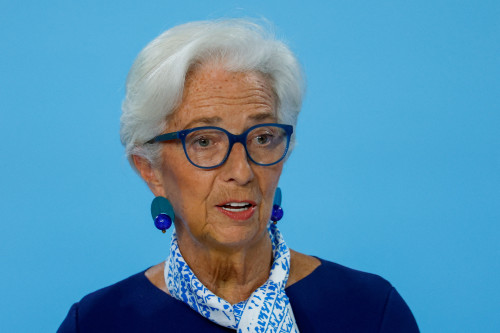LONDON (Reuters) -Traders grew more convinced the European Central Bank’s next move will be a pause on Thursday as signs of an EU-U.S. trade deal nearing and the ECB sounding relatively upbeat on the economic outlook reduced bets on further rate cuts.
Money markets now price in less than a 30% chance of a 25 basis-point rate cut when the ECB meets next on September 11.
That was closer to 50% on Wednesday, before news broke that the European Union and the United States were heading towards a deal that would result in a broad tariff of 15% applying to EU goods.
The ECB, which kept rates on hold after eight cuts over the last year that halved its policy rate to 2%, fuelled the move further.
With the ECB expected to pause on Thursday, analysts said it was President Christine Lagarde’s focus on holding rates that boosted confidence in a September pause.
At the ECB’s post-meeting news conference, Lagarde stressed the ECB was in a “good place” in terms of policy, while downplaying the risk of an inflation undershoot next year and noting that supply bottlenecks and trade disruption caused by tariffs could also emerge as inflationary.
“Perhaps it was the lack of the use of the word pause and she described rates as on hold and decision by decision,” said Dean Turner, an economist at UBS Wealth Management.
Two-year German bond yields, sensitive to interest rate expectations, rose by more than 10 basis points to 1.90%, heading for their largest one-day rise since mid-May.
Its 10-year yield, the benchmark for the euro area, was up similarly.
The euro reversed an earlier fall against the dollar and was last up 0.1% at around $1.179
European shares slightly pared gains following Lagarde’s remarks. The region-wide STOXX 600 was last up around 0.2% versus around 0.4% before the ECB announced its policy decision.
A 15% tariff would be only half the 30% rate U.S. President Donald Trump had threatened to impose on the EU earlier in July. If it materialises it also takes out the ECB’s worst case scenario, which had pencilled in a 20% tariff.
“She’s a bit hawkish,” said Arne Petimezas, director of research at AFS Group, said of Lagarde. “She downplayed the undershooting of inflation in 2026 and she said growth is a bit better than expected.”
(Reporting by Lucy Raitano, Dhara Ranasinghe, Naomi Rovnick and Yoruk Bahceli in London and Danilo Masoni in Milan; Writing by Yoruk Bahceli; Editing by Amanda Cooper and Dhara Ranasinghe)


